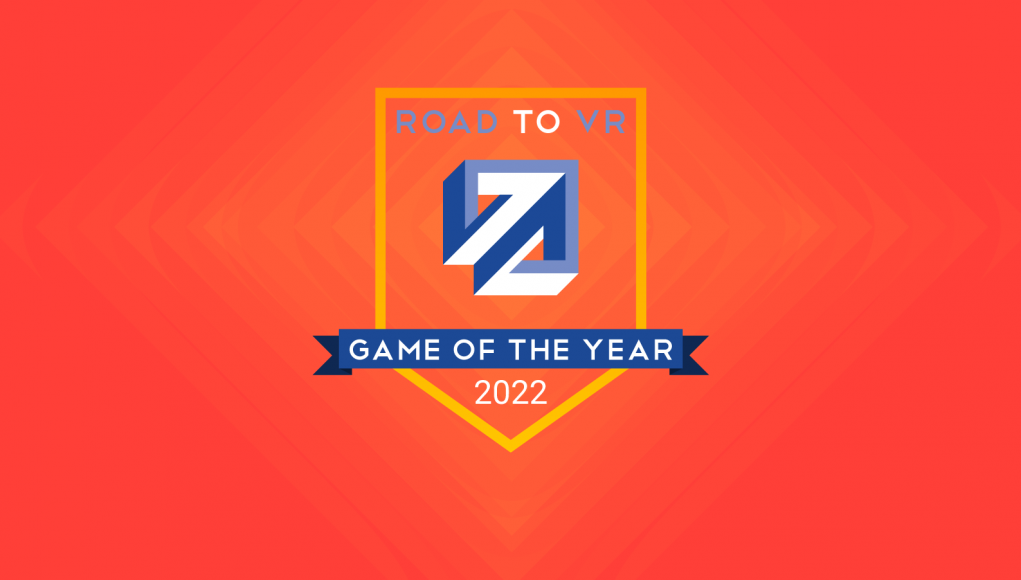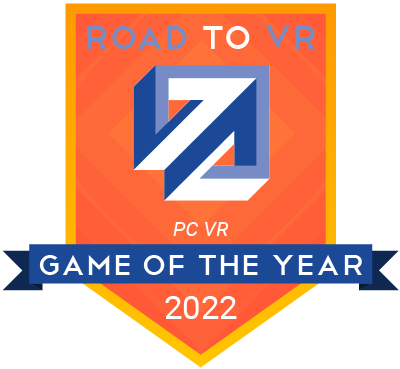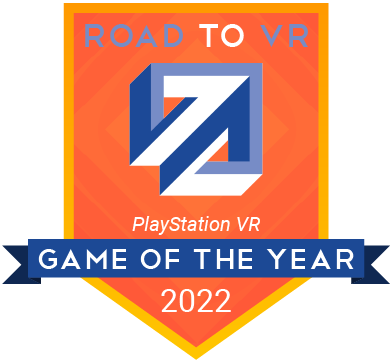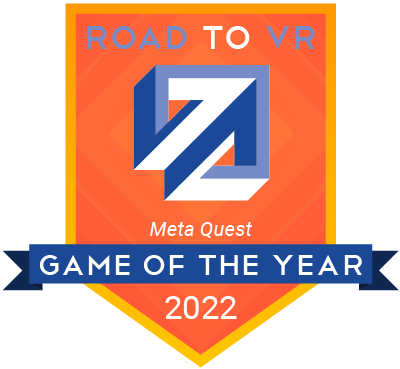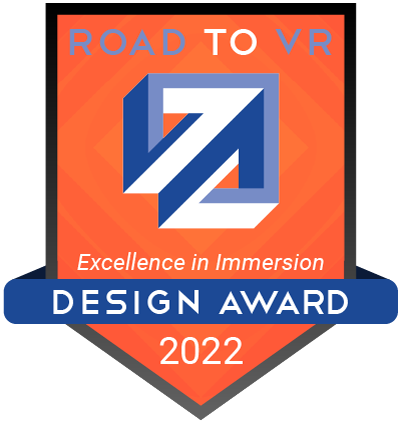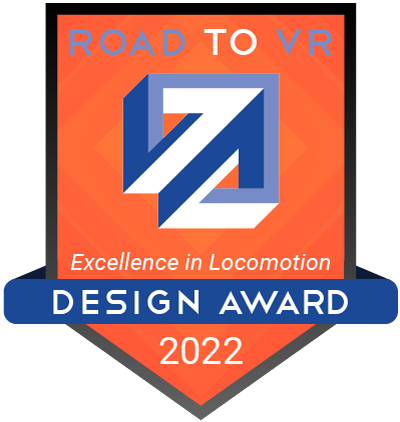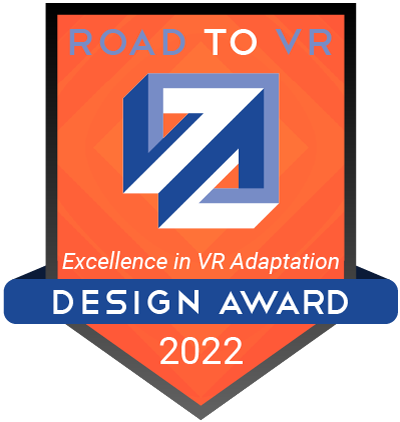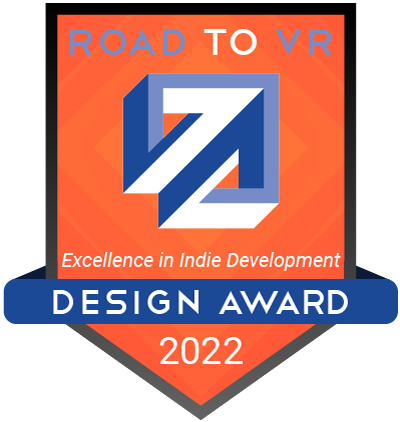Virtual reality opens a portal to every conceivable dimension, whether it be far-flung space stations, medieval dungeons, or fantastical realms translated directly from the minds of this generation’s most talented artists. We were transported from our living rooms, home offices, dorm rooms—anywhere you could unplug a piece of physical reality to make way for the virtual.
And now that a year has gone by, we’re again given the chance to look back and highlight the adventures we had along the way, the lessons we learned, and the new places we all went together.
It’s our sixth annual Game of the Year Awards, and this year has probably been the most difficult yet. As more studios and players become involved in VR, it’s inevitably creating a level of expertise and vibrancy in the medium we’ve never seen before. To boot, we’ve felt it’s time to highlight a new area outside our usual set of platform-specific awards and developer accolades: Ongoing Development. It’s a love letter to the studios who keep on giving well past the time when it might have otherwise made sense to move on to another project.
But without further ado, we present Road to VR’s 2022 Game of the Year Awards:
The Last Clockwinder
Developer: Pontoco
Release Date: June 2nd
Short of fan-made projects, The Last Clockwinder is the closest things you can get to physically stepping into a Hayao Miyazaki creation. Its curious little world springs to life as soon as you put on a pair of magical gloves that give you the ability to make robot copies of yourself in effort to salvage a dying tree, which is home to a whole galaxy’s worth of biodiversity.
We were entranced by its puzzles, which importantly don’t lead you by the nose on how to solve them, letting you breathe in the world and experience it at your own pace and in your own way. And while you may be alone for the duration, the game’s narrative makes for much more than just window dressing to this unique puzzle game. It’s a mature story that deals with battling loneliness, learning to love, devotion to a greater cause, and reconnection—more than enough to put a tear in your eye.
It may not be the most graphically-intense PC VR game out there—after all, it was also developed concurrently for Quest—but there’s no denying the lovably cartoony world is a solid place that feels right on any headset.
Moss: Book II
Developer: Polyarc
Available On: PSVR, Quest 2, Steam
Release Date: March 31st
Moss: Book II builds on the same underlying gameplay formula that made the first a great game. The player controls Quill, an adorable and capable little adventurer, through platforming, light combat, and puzzling.
The ‘diorama’ approach of moving a tiny character through a tiny world is once again put to great use in the game with excellent art direction across the board. Each scene you step into feels like a carefully composed painting of a fantastical land. And this time around players are introduced to two new weapons, each of which includes a special power that doubles as both an attack and a puzzle mechanic—both put to great use within the game’s combat and puzzling.
With the added variety, heaps of polish, and some of the best VR-centric boss encounters I’ve seen in some time, Moss: Book II was a fine sequel to its predecessor and stood out as PSVR’s best game this year.
Red Matter 2
Developer: Vertical Robot
Release Date: August 18th
The original Red Matter was an absolute revelation of how good games can truly look and play on Quest. And the same goes for Red Matter 2, the exciting sequel to the retrofuture sci-fi adventure, which again puts you in the space boots of a spy sent to the far-off test facility belonging to the game’s Soviet analogues, the Volgravians.
The game’s best-in-class graphics and interactions are truly at home on Quest 2, making it feel like a world much larger than its linear narrative may suggest. Although combat was a bit of a letdown—a new addition to the series—this richly interactive slice of galactic intrigue excels in the immersion department in a way that few VR games have. It very nearly approaches Lone Echo and Half-Life: Alyx territory, and all within the humble computational limitations of Quest 2.
Design Awards
Bonelab
Developer: Stress Level Zero
Release Date: September 29th
When it comes to immersion, there’s no doubt that a highly interactive game world is key. Like its predecessor, Bonelab takes an unflinching approach to a fully physics-based world where pretty much anything that looks interactive almost always is.
When things react like you think they should in VR, novel gameplay naturally emerges. Things like pushing enemies away by jabbing them with the barrel of your gun, hooking a crowbar over a ledge to hoist yourself up, or knocking an enemy over by pushing a cart into them, all ‘just work’, leading to bits of immersive magic that are what Bonelab is all about.
Nock
Developer: Normal
Available On: Quest 2
Release Date: March 10th
Nock is one of those VR games that—from the outside—looks like it would make most players dizzy due to its high-speed movement and frequent directional changes. Yet somehow developer Normal has created a unique VR locomotion system that is much more comfortable than it seems from the outside.
Nock’s movement works by having players essentially skate around the arena, propelled by grabbing the ground and flinging themselves in the desired direction.
The ‘skating’ approach is not only part of the game’s comfort design, but it also serves and important gameplay function—because momentum is maintained, players have a few seconds between each push to fire their bow at the ball in an effort to score.
Nock has found a new way to keep players comfortable in VR while enabling competitive, fast paced gameplay that feels very natural.
Cities: VR
Developer: Fast Travel Games
Available On: Quest 2
Release Date: April 28th
Cities: Skylines is a titan in the city simulator genre, and it’s dominated as the go-to SimCity of our time for good reason. When we heard the team behind the game was placing the IP in the capable hands of Fast Travel Games, known for Apex Construct and Wraith: The Oblivion – Afterlife, it was clear VR was going to get something very special.
By necessity, Cities: VR has to retain a lot of legacy features, which includes a litany of 2D screens filled with text-based options. That’s just part and parcel of managing a city though, as you can drill down into planning bus routes, modifying tax rates, and budgeting your power, water, and trash collection.
It’s undoubtedly the most ‘vanilla’ version of Cities: Skylines out there, but seeing your little city flourish from the immersive perspective is certainly something to behold. We also weren’t certain Quest’s humble CPU would be able to handle all of the complex interactions either, but Fast Travel proved us wrong by keeping most of what made the original PC game great and tossing it all in VR so you can tower over your city like Godzilla, or follow around a single NPC as they do their grocery shopping.
Cosmonious High
Developer: Owlchemy Labs
Release Date: March 31st
As a game that does a great job of unleashing your child-like curiosity to play and experiment, Cosmonious High is a seemingly unlikely candidate for recognition of a VR user interface. But with so many different activities and abilities in the game, developer Owlchemy Lab had to fill the game with a bevy of diegetic interfaces that almost never relied on the bare minimum laser pointer method.
From a backpack that worked as the player’s inventory, quest log, and the game’s menu, to an ability menu where you’d simply tap the back of your hand and then grab the power you want, the interfaces of Cosmonious High are so naturally integrated into the gameworld that you’d be forgiven for not recognizing them as ‘interfaces’ at all.
Virtuoso
Developer: Really Interactive
Release Date: March 10th
Every so often a game comes along that you swear must have been developed by a 20-person strong team with a flashy office in the city center. Not so with Really Interactive, a Stockholm-based indie comprised of four developers who have shown a strong grasp on what makes VR great, not to mention an uncanny ability to bring something unique and useful to life.
In Virtuoso, you’re given the ability to play and record your own music on a set of ingenious tools. Far from being just virtual analogues of real-world instruments, Virtuoso creates interesting, VR-native ways to interact with music, letting you layer drums and an awesome assortment of synthesizers in your own virtual studio space. Since it focuses mostly on looping music to make tracks, creating a unique and complex sound is fairly simple, although it’s a platform that’s ultimately deep enough to invite the expertise of musicians looking for an immersive way to ideate their next song.
Pistol Whip
Developer: Cloudhead Games
Available On: Quest 2, Steam, PSVR
Release Date: November 7th, 2019
When Pistol Whip first launched back in 2019, it already felt like a complete game that brought a new twist on VR rhythm gaming by bringing shooting, dodging, and melee into the mix.
While ‘more songs’ was the obvious way to expand the life of the game, developer Cloudhead Games has gone further by releasing themed music packs with new levels, weapons, and even boss fights—all wrapped up in ‘mini-campaign’ that strings all of the levels together under an illustrated narrative.
But that’s not all—over the years the studio has also expanded the way players can play the game with new modifiers, weapon selections, and unique leaderboards that let you compete with others in the way that you want to play the game.
And now, even three years after release, the studio isn’t done. After a recent update which improved the game’s interface and tutorials, in 2023 Pistol Whip is set to get a custom level making tool and five more songs.
Note: Games eligible for Road to VR‘s Game of the Year Award must be available to the public on or before December 12th, 2022 to allow for ample deliberation. Games must also natively support the target platform as to ensure full operability.

